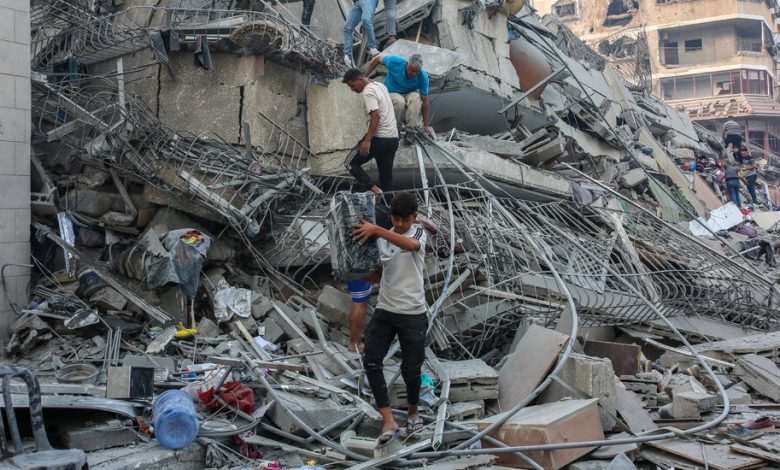Israel and Hamas Battle Around Gaza as Netanyahu Warns of ‘Long and Difficult War’

Israeli troops fought to expel Palestinian militants from Israeli territory for a second day on Sunday, battling in firefights between homes, ducking under rocket fire and striking Gazan cities from the sky in retaliation for the militants’ assault, which officials described as the worst attack on Israel in decades.
By evening on Sunday, the estimated death toll hovered around 1,100 people killed in 36 hours — though the number was clouded by the continued fighting and the uncertain fate of many Israelis and Palestinians in embattled areas. Prime Minister Benjamin Netanyahu warned Israelis to brace themselves for the days ahead.
“We are embarking on a long and difficult war that was forced on us by a murderous Hamas attack,” he said in a statement, referring to the militant group that controls the Gaza Strip. He added that Israel’s military had “begun the offensive phase, which will continue with neither limitations nor respite until the objectives are achieved.”
Israeli tanks could be seen crossing farmland in parts of southern Israel, heading south toward Gaza, and the military ordered an evacuation of civilians from 24 villages near the Gaza border, a possible prelude to a ground assault. Israeli warplanes also struck Gazan cities in response for the attack on Saturday, in which militants infiltrated more than 20 Israeli towns and army bases, opening fire on soldiers and civilians and taking some hostage.
Israel’s Foreign Ministry said on social media that 700 Israelis had been killed, and a senior defense Israeli defense official said an early assessment showed that at least 150 people have been taken hostage by Palestinian militants. At least 413 Palestinians have been killed, according to the Gaza Health Ministry.
The U.S. secretary of state, Antony J. Blinken, compared the attack by Hamas to the Yom Kippur War of 1973, a 19-day battle set off by an Egyptian and Syrian invasion that caught Israel off guard. But “the magnitude, the scale of what Hamas did here is something we haven’t seen before,” Mr. Blinken added, in an interview with CBS News.
The White House also promised military assistance to Israel, and President Biden spoke with Mr. Netanyahu in a call on Sunday, White House officials said. In the call, Mr. Biden “discussed the taking of hostages by Hamas terrorists, including entire families, the elderly and young children,” according to the White House.
It was unclear whether any Americans were among those abducted. A National Security Council spokesperson said “several” U.S. citizens had been killed in the fighting.
The Biden administration has condemned Hamas, which the United States classifies as a terrorist organization, and restated its commitment to normalizing ties between Israel and Arab nations in the region — a campaign that the violence threatens to upend.
Two of Israel’s neighbors, Egypt and Jordan, joined calls to de-escalate the conflict. But in Lebanon, Hezbollah, the Shiite militant organization that fought a war with Israel in 2006, said on Sunday that it had attacked three Israeli posts with artillery shells and guided missiles in the Shebaa Farms area.
The Israeli military responded with artillery fire and a drone strike, and U.N. peacekeeping forces said on Sunday that the situation at the border was “volatile but stable” after the exchange.
On Sunday, some witnesses to the initial Hamas attack near Gaza began to tell harrowing accounts, including how, in some cases, they learned of the invasion by seeing or hearing gunmen just outside their homes. Many would learn only later that militants were also taking Israeli soldiers and civilians as hostages.
“There were terrorists inside the kibbutz, inside our neighborhood and — at some point — outside our window,” Amir Tibon, 35, recalled in a phone interview after his escape from a village just a few hundred yards from the Gaza Strip. “We could hear them talk. We could hear them run. We could hear them shooting their guns at our house, at our windows.”
Other Israelis described an all-out attack on a music festival a few miles from the border with Gaza. “Smoke and flames and gunfire,” said Andrey Peairie, a 35-year-old resident of Kiryat Gat. “I have a military background, but I never was in a situation like this.”
On Sunday, many Israelis remained missing, and some were believed to be among the soldiers and civilians who have been taken into captivity. Video verified by The New York Times appears to show several Israelis being taken hostage by Hamas militants in the Be’eri kibbutz, just under three miles from the border.
The kidnappings could complicate any Israeli retaliatory response, and on Saturday night the Israeli government moved to increase pressure on Gaza beyond military force. It cut off its electricity supply for Gaza, a densely populated and impoverished territory that relies on Israel for two-thirds of its power.
Mr. Netanyahu also urged Palestinians on Saturday night to leave any place in the Gaza Strip where militants might be hiding or operating, in anticipation of a major Israeli retaliation. But some residents said there was nowhere to run or hide on the territory, which has been under a suffocating 16-year blockade imposed by Israel.
“Where are we going to go?” said Ziad al-Saad, 63, adding that he and his family, including young grandchildren, had stayed inside all night as the walls shuddered with Israeli strikes. “There are no shelters, no nothing. We are a tiny strip of land, and it can barely hold all the people here.”
If the situation worsened, he said, the family might at least take the children to the hospital for safety, in the hopes that it would be less likely to be attacked.
“The sea is behind us and the enemy is in front of us,” he said.
Reporting was contributed by Gabby Sobelman, Myra Noveck, Ronen Bergman, Hiba Yazbek, Raja Abdulrahim, Aaron Boxerman, Edward Wong, Michael D. Shear and Ameera Harouda.





